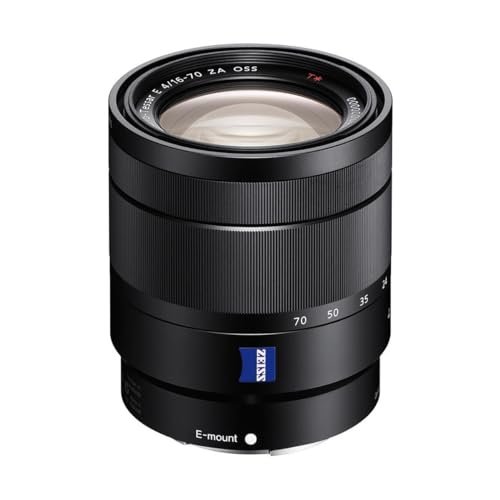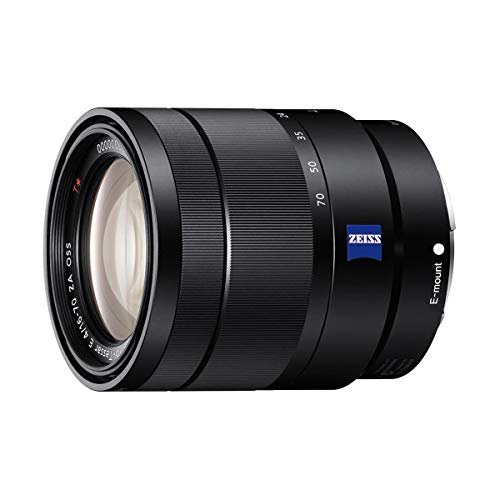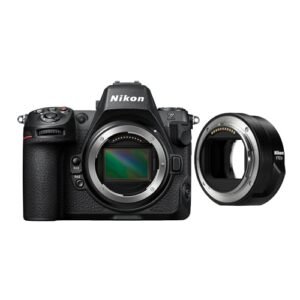Description
Product Description
Outstanding contrast and resolution throughout the image area at all zoom settings are the hallmark of this high-performance Carl Zeiss mid-range zoom lens The latest advances in optical design technology have made it possible to deliver prized Carl Zeiss contrast and clarity in a high-performance mid-range zoom. Four aspherical elements combine with one ED glass element to bring you breathtaking rendering. When changing your aperture to defocus the background, the light sources appear blurred. This ‘bokeh’ effect of the blurred background can be enhanced with circular aperture blades used in this lens. Conventional aperture blades have flat sides creating unappealing polygonal shaped defocussed points of light. α lenses overcome this problem through a unique design that keeps the aperture almost perfectly circular from its wide-open setting to when it is closed by 2 stops. Smoother, more natural defocusing can be obtained as a result. As focal lengths get longer, lenses built with conventional optical glass have difficulties with chromatic aberration, and as a result images suffer from lower contrast, lower color quality, and lower resolution. ED glass dramatically reduces chromatic aberration at telephoto ranges, and provides superior contrast across the entire image, even at large aperture settings. Super ED glass provides enhanced compensation for chromatic aberration. Aspherical lens design dramatically reduces spherical aberration while also reducing lens size and weight. Spherical aberration is a slight misalignment of the light rays projected on the image plane. This is caused by differences in refraction at different points on conventional spherical lenses which degrade image quality in large-aperture lenses. Specially shaped “aspherical” elements near the diaphragm restore alignment of light rays at the image plane, maintaining high sharpness and contrast even at maximum aperture and can also be used at other points in the optical path to reduce distortion. Well-designed aspherical elements can reduce the total number of elements required in the lens, thus reducing overall size and weight. Advanced Aspherical (AA) elements are an evolved variant, featuring an extremely high thickness ratio between the center and periphery. AA elements are exceedingly difficult to produce, relying on the most advanced molding technology to consistently and precisely achieve the required shape and surface accuracy, resulting in significantly improved image accuracy and quality. Coated optics were pioneered by Carl Zeiss – and this superb lens features the Carl Zeiss T* (T-Star) coating that virtually eliminates lens flare, internal reflection and light scattering that can otherwise occur at glass-to-air surfaces. The T* coating contributes to outstanding image quality, with high contrast and uniformly excellent resolution right out to the image edges. Not simply applied to any lens – the T* symbol only appears on multi-element lenses in which the required performance has been achieved throughout the entire optical path, therefore guaranteeing the highest quality. Gyro sensors built into the lens detect even the slightest movement, and the stabilization lens is precisely shifted to counteract any image blur that might occur. The use of precision, quiet linear motors and technology inherited from high-end Sony professional camcorders results in exceptionally quiet, effective image stabilization that contributes to high-quality movies as well as stills. Only the middle groups of the optical system move to achieve focus, so the overall length of the lens does not change. Other important benefits include fast autofocusing and a short minimum focusing distance. Also, the filter thread at the front of the lens does not rotate, which is convenient if you’re using a polarizing filter. 2013 Sony Electronics All rights reserved. Reproduction in whole or in part without written permission is prohibited. Sony is not responsible for typographical and photographic errors. Features and specifications are subject to change without notice. All rights reserved. Sony, the Sony logo, Alpha, (a) and Super SteadyShot are trademarks of Sony. All other trademarks are trademarks of their respective owners.
From the Manufacturer
Vario-Tessar T* E 16-70mm F4 ZA OSS Lens
The latest advances in optical design technology have made it possible to deliver prized Carl Zeiss contrast and clarity in a high-performance mid-range zoom. Four aspherical elements combine with one ED glass element to bring you breathtaking rendering.
Technology
Circular Aperture
When changing your aperture to defocus the background, the light sources appear blurred. This ‘bokeh’ effect of the blurred background can be enhanced with circular aperture blades used in this lens. Conventional aperture blades have flat sides creating unappealing polygonal shaped defocussed points of light. α lenses overcome this problem through a unique design that keeps the aperture almost perfectly circular from its wide-open setting to when it is closed by 2 stops. Smoother, more natural defocusing can be obtained as a result.
ED (Extra-low Dispersion) glass
As focal lengths get longer, lenses built with conventional optical glass have difficulties with chromatic aberration, and as a result images suffer from lower contrast, lower color quality, and lower resolution. ED glass dramatically reduces chromatic aberration at telephoto ranges, and provides superior contrast across the entire image, even at large aperture settings. Super ED glass provides enhanced compensation for chromatic aberration.
Aspherical lens elements
Aspherical lens design dramatically reduces spherical aberration while also reducing lens size and weight. Spherical aberration is a slight misalignment of the light rays projected on the image plane. This is caused by differences in refraction at different points on conventional spherical lenses which degrade image quality in large-aperture lenses. Specially shaped “aspherical” elements near the diaphragm restore alignment of light rays at the image plane, maintaining high sharpness and contrast even at maximum aperture and can also be used at other points in the optical path to reduce distortion. Well-designed aspherical elements can reduce the total number of elements required in the lens, thus reducing overall size and weight. Advanced Aspherical (AA) elements are an evolved variant, featuring an extremely high thickness ratio between the center and periphery. AA elements are exceedingly difficult to produce, relying on the most advanced molding technology to consistently and precisely achieve the required shape and surface accuracy, resulting in significantly improved image accuracy and quality.
Carl Zeiss T* (T-star) coating
Coated optics were pioneered by Carl Zeiss – and this superb lens features the Carl Zeiss T* (T-Star) coating that virtually eliminates lens flare, internal reflection and light scattering that can otherwise occur at glass-to-air surfaces. The T* coating contributes to outstanding image quality, with high contrast and uniformly excellent resolution right out to the image edges. Not simply applied to any lens – the T* symbol only appears on multi-element lenses in which the required performance has been achieved throughout the entire optical path, therefore guaranteeing the highest quality.
Lens-based optical image stabilization
Gyro sensors built into the lens detect even the slightest movement, and the stabilization lens is precisely shifted to counteract any image blur that might occur. The use of precision, quiet linear motors and technology inherited from high-end Sony professional camcorders results in exceptionally quiet, effective image stabilization that contributes to high-quality movies as well as stills.
Additional Features
Internal focusing
Only the middle groups of the optical system move to achieve focus, so the overall length of the lens does not change. Other important benefits include fast autofocusing and a short minimum focusing distance. Also, the filter thread at the front of the lens does not rotate, which is convenient if you’re using a polarizing filter.
2013 Sony Electronics Inc. All rights reserved. Reproduction in whole or in part without written permission is prohibited. Sony is not responsible for typographical and photographic errors. Features and specifications are subject to change without notice. All rights reserved. Sony, the Sony logo, Alpha, (a) and Super SteadyShot are trademarks of Sony. All other trademarks are trademarks of their respective owners.






Reviews
There are no reviews yet.